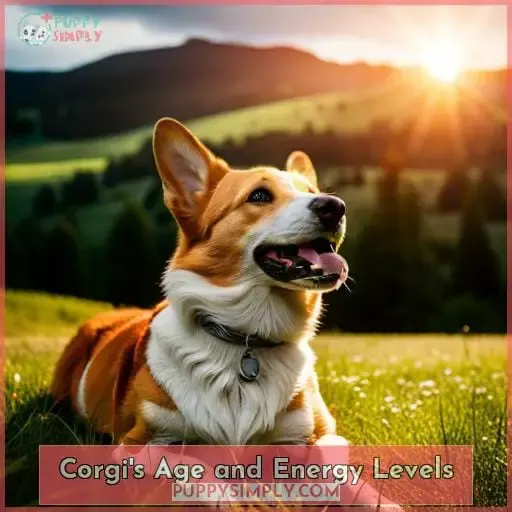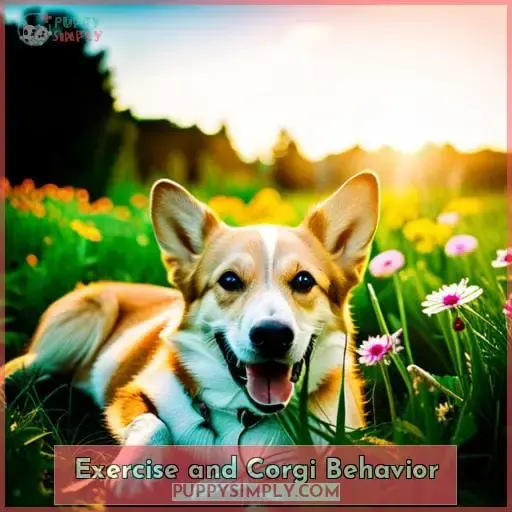This site is supported by our readers. We may earn a commission, at no cost to you, if you purchase through links.
 You crave the boundless energy of a corgi pup, yet dread the chaos.
You crave the boundless energy of a corgi pup, yet dread the chaos.
When will your bundle of joy settle?
Corgis reach full size by 10-12 months, but their rambunctious spirit continues longer.
However, you can curb crazy corgi antics through understanding their needs and using calming techniques.
This article explores why corgis stay energetic, how to mellow mania, and what to expect as your pup grows up.
Soon, you’ll have a calmer canine companion.
Table Of Contents
- Key Takeaways
- When Do Corgis Start Calming Down?
- Reasons for Corgi Excitement
- Calming Techniques for Corgis
- Corgi’s Age and Energy Levels
- Impact of Neutering on Corgi Behavior
- Exercise and Corgi Behavior
- Corgi Puppy Facts
- Frequently Asked Questions (FAQs)
- What toys are best for keeping my Corgi entertained and burning energy?
- How much exercise does my Corgi puppy need every day?
- Is crate training recommended for Corgis to promote relaxation?
- Should I be concerned if my 1-year-old Corgi still seems very energetic and excitable?
- Are there any natural supplements or calming aids I can try for my energetic Corgi?
- Conclusion
Key Takeaways
- Corgis tend to calm down around 1-2 years old as they mature out of the puppy stage.
- Individual corgi energy levels and temperaments can vary regardless of age.
- Neutering may potentially help reduce territorial and aggressive behaviors.
- Proper training, socialization, exercise, and healthcare are important for helping corgis develop calmer behaviors.
When Do Corgis Start Calming Down?
Most Corgis start calming down around 1-2 years old, though some may take longer depending on their individual personality and energy levels.
It’s important to understand that every Corgi is unique and may have different timelines for calming down.
Factors such as their innate activity level and training can also influence when they start to calm down.
To help your Corgi calm down, consider implementing the following strategies:
- Provide regular exercise: Engaging in daily physical activities such as walks or interactive playtime can help burn off excess energy.
- Focus on training: Consistent obedience training helps instill discipline in your Corgi, leading to better behavior.
- Consider neutering: Neutering can potentially reduce territorial behaviors and aggression in some dogs. However, it’s essential to consult with a veterinarian before making this decision.
Additionally, socialization plays a vital role in helping your Corgi become well-adjusted.
Introduce them to various environments, people, and other animals from an early age so that they learn appropriate behaviors.
Remember that patience is key when it comes to managing high-energy puppies.
Creating a consistent routine with plenty of mental stimulation will contribute greatly towards helping your beloved furry friend reach a calmer state as they mature.
Soon enough, you’ll see noticeable improvements in their behavior as you navigate through the puppy stage together!
Reasons for Corgi Excitement
As a high energy breed, your Corgi puppy’s excitement often stems from excess stimulation and a lack of sufficient outlets for all that pent-up energy.
New toys, events, smells, or even just rearranged furniture can trigger your pup’s lively personality into overdrive.
Providing plenty of exercise opportunities and mental stimulation is key to managing your energetic Corgi companion.
High Energy Breed
You’d expect high energy from a herding breed like the Corgi.
These energetic puppies need regular playtime and exercise outlets for their natural liveliness.
As herding dogs, Corgis have an alert temperament and excess energy needing release through frequent play, toys, and attention.
Lack of constructive stimulation and pent-up energy can exacerbate excitable behaviors.
Consider providing various games, chew toys, walks, and training to channel energy positively.
Excess Stimulation Triggers
Seeing your Corgi get excited by new toys, walks, guests, food, or changes shows their energy needs an outlet through playtime and exercise. Distractions like these overstimulate Corgis. Try relaxation techniques when they get too excited:
Physical:
- Walks
- Games
Mental:
- Training
- Puzzles
Emotional:
- Petting
- Cuddles
Environmental:
- Calm music
- Cozy bed
Providing various stimulating yet calming activities helps manage their energy and prevents behavioral issues from developing.
Lack Of Exercise Outlets
Not providing enough outlets for your corgi’s energy can result in pent-up excitement.
Without sufficient physical and mental stimulation, your energetic corgi may become restless.
Make time for daily outdoor activities like walks, runs, or play sessions to release built-up energy.
Additionally, incorporate mental stimulation through interactive toys, training games, or socialization playdates with other dogs.
Understanding the active corgi temperament means providing consistent opportunities that tap into their natural liveliness before excitement bubbles over.
Calming Techniques for Corgis
You can help calm your energetic Corgi puppy by providing them with a safe, comfortable place to relax when they need a break.
Avoid overstimulating your Corgi by getting them riled up through sudden movements or high-pitched sounds.
Remaining composed yourself can also help them settle down.
Provide a Safe Place
Your corgi’s designated sleeping area with familiar bedding can promote relaxation when overstimulation occurs.
Equip a quiet corner or room in your home to be your corgi’s safe haven for unwinding.
Designate a tranquil retreat with their favorite blankets and toys to retreat to when overly excited.
Make it a cozy sanctuary where they can settle into rest mode.
Having this relaxation zone or secure retreat prepares a designated spot for your corgi to practice calming behaviors.
Use treats to positively reinforce entering their safe place for some solo settling time.
Rotate toys in the area to keep their relaxation zone engaging over time.
Patiently work on training go to bed when redirecting your corgi to their safe harbor for breaks from chaos.
Don’t Hype Your Dog
Don’t get your dog more riled up while trying to settle them down.
Avoid overly stimulating your corgi during calming times.
Forcibly restricting a worked-up pup can backfire, escalating their energy.
Instead, gently guide them toward relaxing activities.
Engage in quiet play using soft toys that don’t incite roughhousing.
Speak softly and pet them lightly.
Create tranquil environments conducive to rest by eliminating excess noise and commotion.
Use serene training techniques that emphasize praise over punishment.
Corgis thrive on positive interactions and consistency.
Establishing designated downtime rituals helps high-energy pups understand when it’s time to chill out.
With understanding owners, corgis gradually become more manageable.
Corgi’s Age and Energy Levels
With age, your Corgi may become more relaxed and less hyperactive around 1-2 years old when reaching adulthood, though energy levels can still vary between individual dogs.
As your Corgi grows from a puppy into an adult dog, their boundless puppy energy usually starts to settle.
However, due to differences in upbringing, genetics, and health, some Corgis retain a highly energetic temperament throughout life.
While neutering can potentially curb aggressive or territorial behaviors related to hormones, its impact depends on your individual Corgi’s innate personality.
Proper training, socialization, mental stimulation through games and tasks, and meeting their healthcare needs can promote calmer behaviors.
Though Corgis have an average lifespan of 12-15 years, health issues like joint problems or cardiac disease may decrease energy faster.
With patience and properly addressing their enrichment requirements, you can manage your Corgi’s energy.
Consistency in training and setting rules will help them understand what’s expected behavior.
Ultimately your Corgi’s energy levels come down to appropriate stimulation, exercise, training, socialization, and healthcare.
Impact of Neutering on Corgi Behavior
One can’t guarantee that neutering will fix a Corgi’s behavioral issues, but it may reduce aggressive and territorial behaviors by lowering testosterone levels.
The impact of neutering on behavior can vary due to individual personality, upbringing, training, and socialization.
While neutering does reduce testosterone, which can mitigate some problematic behaviors, it doesn’t necessarily eliminate them.
After all, behavior is complex and depends on more than hormones alone.
Consider a Corgi’s unique history and circumstances before deciding that neutering alone will solve a behavioral problem.
Realize that spaying or neutering should never replace proper socialization, humane training methods, exercise, and meeting your Corgi’s needs.
Consult with your veterinarian, as they can provide guidance on the potential behavioral effects of neutering for your unique Corgi based on their health, age, and temperament.
While the hormonal influences can’t be denied, view neutering as just one piece of creating an environment where your Corgi can thrive.
Exercise and Corgi Behavior
To manage a Corgi’s high energy and promote better behavior, regular exercise is essential.
Engaging your Corgi in both physical and mental stimulation helps channel excess energy constructively.
Try taking your Corgi on daily walks where they can sniff, explore, and engage their natural curiosity.
Interactive games like fetch or tug-of-war are great outlets for physical energy.
Training sessions focused on commands or tricks provide mental stimulation.
Teaching new behaviors satisfies their working breed instincts.
Relaxation techniques like gentle petting or music may help post-exercise.
Over time, regular activity routines promote better self-regulation of energy.
However, results vary – some Corgis seem endlessly energetic regardless of exercise.
Neutering may reduce aggression but doesn’t necessarily calm hyper behavior.
Consistency with exercise and training is key for long-term impacts.
Ultimately, Corgis thrive when their minds and bodies stay actively engaged.
The payoff is a happier, better-behaved furry friend.
Corgi Puppy Facts
Regarding Corgi puppies, you’ll find their average litter contains six to eight pups reaching full size around 12 inches tall and 26-38 pounds. Their temperament is shaped by training, activity levels, and mental stimulation.
Corgi Breeds:
- Pembroke Welsh Corgi
- Cardigan Welsh Corgi
- Teacup Corgi
- Cowboy Corgi
Shedding Patterns:
- Heavy shedders
- Shed heavily in late spring/early summer
Training Methods:
- Positive reinforcement
- Consistency
- Socialization
Health Concerns:
- Hip/elbow dysplasia
- Eye issues
- Cardiac problems
When adopting a Corgi puppy, prepare for an intelligent, playful addition to your family. Early and consistent training will shape good behaviors. Daily exercise prevents boredom and destructive habits.
Regular grooming helps manage heavy seasonal shedding. Vet checks identify potential health issues to monitor. With understanding of the breed and proper care, Corgis make wonderful, lively companions.
Frequently Asked Questions (FAQs)
What toys are best for keeping my Corgi entertained and burning energy?
Try interactive toys like balls, ropes, and puzzles to stimulate your Corgi mentally and physically.
Take them on longer walks or to a dog park to burn energy through play.
Consistent daily exercise and training will help channel their natural energy and curiosity into positive outlets.
How much exercise does my Corgi puppy need every day?
Give your Corgi puppy at least 30-60 minutes of total exercise per day.
Take them on two 15-30 minute walks, play active games like fetch in the yard, or take them to a park where they can safely run around and socialize.
Mental stimulation through training is also important for meeting their needs.
Adjust based on your puppy’s energy levels.
Is crate training recommended for Corgis to promote relaxation?
Yes, crate training can promote relaxation in Corgis.
Confine them to a cozy crate when you can’t supervise activity. This provides a den-like retreat, fulfilling nesting instincts.
Make it positive with treats and praise.
Start slow. Advance duration gradually once accustomed.
Don’t use the crate solely for punishment, as that risks anxiety.
Overall, proper crate training taps into natural canine behaviors, offering Corgis a calm oasis amid stimuli.
Should I be concerned if my 1-year-old Corgi still seems very energetic and excitable?
No need to worry if your 1-year-old Corgi still has lots of energy.
This breed is known for being very active and excitable, even into adulthood.
Try more vigorous daily exercise and training to help channel that enthusiasm.
Patience and consistency will pay off over time.
Are there any natural supplements or calming aids I can try for my energetic Corgi?
Try calming aids like melatonin or CBD oil under veterinary guidance.
However, increased activity and attention at this age are normal for the breed.
Focus on positive reinforcement training and scheduled playtime.
As your Corgi matures over the next year, additional techniques like crate rest can help settle high energy.
But patience and consistency now build good habits for the long term.
Conclusion
When Maggie brought home her corgi puppy Bo, she thrilled in his energetic antics, yet also longed for calm.
As Bo reached 10 months old, Maggie provided daily exercise, plus mental stimulation through training and puzzles.
She also set up his crate with blankets as a quiet retreat when the chaos overwhelmed.
Now at a year old, Bo still has a zest for life, but settles readily with these understanding and calming techniques.
Maggie looks forward to many more years with her now mellower canine companion.













